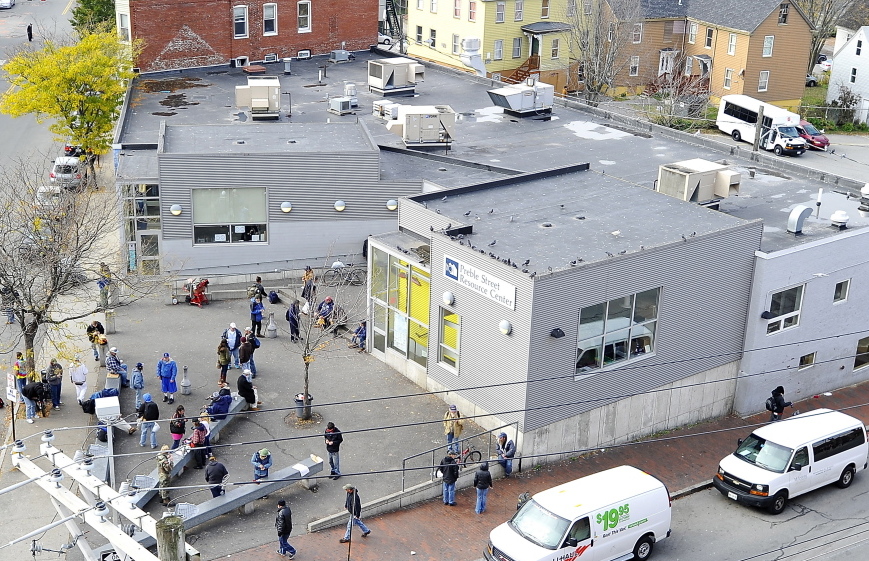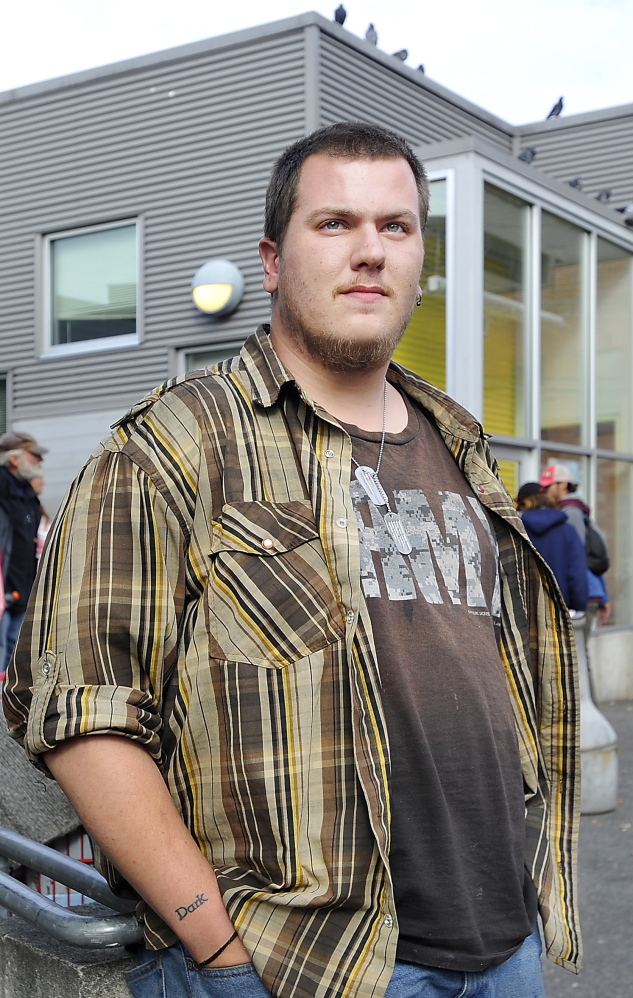Portland officials and Preble Street Resource Center representatives are exploring whether to build a large homeless shelter and soup kitchen to centralize services now spread around the city and to help alleviate chronic overcrowding.
Mark Swann, Preble Street’s executive director, first floated the idea of building a new, large shelter near downtown Portland to be run by the nonprofit with support from the city. Swann said he initially suggested a city-owned parcel in Bayside on Hanover Street – a suggestion that has already stoked the concerns of some Bayside leaders and could conflict with city officials’ plans for the site.
Both he and acting City Manager Sheila Hill-Christian described the discussions as “preliminary” and said the first task – before any decisions about a potential location – will be determining whether the proposal works financially for Preble Street and the city. But a City Council committee recently gave them the green light to continue the discussions and report back.
“It started out as a lunch conversation and we wanted to bring it to the council’s attention,” Hill-Christian said. “We are sitting down and looking at budget numbers just to see whether this makes sense.”
Swann said that with a large, consolidated shelter and soup kitchen operating 24 hours a day, the city could terminate its lease of the privately owned Oxford Street building that serves as the city’s primary shelter. Also, the resource center would relocate to the new facility, opening up a large Preble Street building located just blocks from the bustling business district on Congress Street. And with a 24/7 facility offering one-stop services, the city homeless population would not have to shuffle from place to place, he said.
“I look at this as a potentially very exciting model to do things differently with the shelters and with the homeless,” said Swann, whose organization also runs shelters, a soup kitchen and social services programs. “It would be so much easier for clients and could be better for the neighborhood as well. The thing that gets us excited is we could have a blank slate here and do things better than we currently do.”
Portland has experienced record-setting demand for shelter space in recent years, attributable to both the lingering economic downturn and the city’s status as the regional hub for social services.
Demand far outstrips the Oxford Street shelter’s capacity every night, forcing dozens of people to sleep on mats at the Preble Street Resource Center or in chairs in city office buildings. People begin queuing up long before the shelter opens in hopes of securing a bed. But while the number of average nightly users has gradually fallen this year from a high of 243 in January to 217 in September, that is still roughly twice the number of beds available at Oxford Street on any given night.
“There has been such a huge increase,” Travis Durr, a 22-year-old who has been homeless off and on for five years, said of the competition for beds. “It gets to the point where people are sleeping in chairs at night and they are not getting the rest they need. … It affects the way people are able to get things done because they are so tired that they can’t function.”
Durr said he recently lost a job after getting little to no sleep over three nights, forced to sleep in a chair. One former job didn’t end until 8 or 9 p.m., which is too late to be guaranteed a bed. And other people working overnight shifts as they try to get back on their feet have nowhere to sleep when their shifts end because the city doesn’t offer any daytime sleep shelters. So Durr said a larger shelter operating all day would certainly help – but only if it is accompanied by enough staff to handle casework.
One potential location that Swann has eyed is the Hanover Street lots in Bayside now occupied by the Portland Department of Public Services. The department has plans to relocate elsewhere, but a shelter would have to compete with a host of other parties interested in the lot, including some city officials who view it as an ideal location for affordable housing.
Some Bayside leaders are already voicing their opposition to a large shelter in the neighborhood.
“I think there is a lot of concern – and ‘concern’ is putting it lightly – that they want to build a much larger shelter on the public services site,” said Steve Hirshon, president of the Bayside Neighborhood Association. “The idea of a 300-bed shelter is probably a little large for this neighborhood.”
Hirshon noted that Bayside is already home to not only the Oxford Street shelter and the Preble Street Resource Center but also shelters for families, teenagers, the largest soup kitchen and many of the city’s social services programs.
Seemingly every time city officials want to add another program, Hirshon said, they look to Bayside. Because Portland’s shelters already serve people from outside of the city, Hirshon said an even larger, new shelter would attract more people.
“The city owns a lot of land and the county owns a lot of land,” Hirshon said. “It needs to be a regional decision. Even if Portland is the lead on this, there needs to be a collaborative approach.”
Ron Spinella, another longtime Bayside resident who has been active in the neighborhood association, said the area needs more residential and commercial development. A 300-bed homeless shelter “does nothing for the Bayside neighborhood” and could discourage redevelopment in that area, he said.
“You can only ask so much from a neighborhood or community,” Spinella said.
Swann, with Preble Street Resource Center, said zoning restrictions limit the number of places in the city that can accommodate a homeless shelter. The dialogue with city staff is part of a broader conversation that needs to happen about the best options going forward for meeting the needs of the city’s homeless population, he said.
While the public services lot would be a good location, given its access to other city services and public transit, Swann said it is not likely the only option.
“I think it would be an exciting opportunity for us,” Swann said. “Having said that, … I don’t know if it will be available and perhaps there are better spaces.”
Portland has made progress recently in addressing the overflow.
A program launched in January found permanent housing for 27 of 30 individuals who were considered “long-term stayers,” meaning they stay in shelters night after night, according to a staff report submitted recently to a City Council committee. City officials have also succeeded in closing one “overflow room” used by people unable to find bed space at one of the shelters and reduced the use of two other overflow rooms, the report said.
Hill-Christian agreed that addressing the region’s homeless problem has to be a collaborative effort involving municipalities, nonprofits and private organizations. Part of the current discussion is focused on identifying potential duplication across the players in order to improve both services and efficiency, she said.
“Funds are scarce and these are challenging times,” Hill-Christian said. “In order to maximize taxpayer dollars, we have to make sure we are talking to everyone.”
Send questions/comments to the editors.





Comments are no longer available on this story